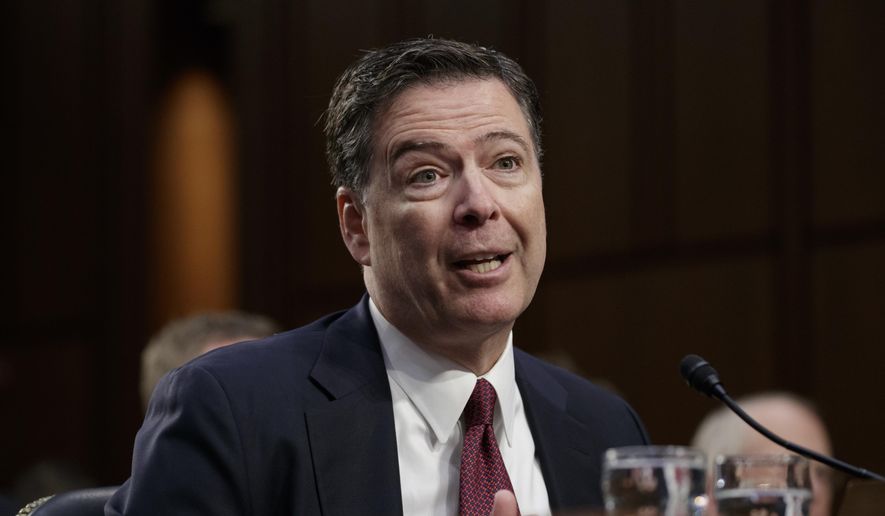It was reported as a damaging day for the White House, but the frank, dramatic admission by fired FBI Director James B. Comey last week about how he managed to put his confidential conversations with President Trump on the front page of the nation’s newspapers has some legal experts saying Mr. Comey may be in trouble himself over unauthorized leaking.
Critics of Mr. Comey say his calculated formulation and leak of the memos through a third party suggest his actions were part of a deliberate and vendetta-driven plot — crossing dangerous lines regarding the classification of government documents and FBI conduct. They say Mr. Comey should be investigated too.
While they’ve mentioned possible violations of the Espionage Act, or prosecutable breaches of FBI protocol, the real point of controversy centers on Mr. Comey’s admission that he leaked his memos to “prompt the appointment of a special counsel” — which happened soon after the substance of his memos went public. This, they say, exposes his action as more of a self-serving Washington operator, than a move legally protected by the former head of the FBI.
“Our relationship didn’t get off to a great start given the conversation I had to have,” Mr. Comey explained as to why he wrote the memos.
Critics say Mr. Comey’s use of a friend to convey the memo’s revelations to The New York Times last month is evidence that the leak was a multistep plot to take the down the president and that Mr. Comey executed a sort of political vendetta. The president has little doubt that it was Mr. Comey’s leaking — not what he leaked — that is the real crime in their conflict.
“He’s a leaker,” Mr. Trump told reporters at a Rose Garden press conference the day after Mr. Comey’s testimony. His lawyer, Marc Kasowitz, has made the surreptitious way Mr. Comey first divulged the contents of the memos a central part of his defense of his client.
Mr. Comey’s “excuse for this unauthorized disclosure of privileged information … appears to be entirely retaliatory,” Mr. Kasowitz said in the statement after the FBI chief had testified publicly last week. “We will leave it [to] the appropriate authorities to determine whether these leaks should be investigated along with all those others being investigated.”
Mr. Comey’s legal supporters insist the disclosure was well within his constitutional rights. They add that it may have been a threatening tweet from Mr. Trump implying that he had tapes of their discussions that gave Mr. Comey the cover to leak legally.
Mr. Comey himself told the Senate Intelligence Committee last that “my judgment was I needed to get [the memos] out into the public square.” He went on, “So, I asked a friend of mine to share the content of the memo with a reporter. I didn’t do it myself for a variety of reasons, but I asked him to because I thought that might prompt the appointment of a special counsel.”
The memos described multiple interactions with Mr. Trump, which began on January 6 during the presidential transition when Mr. Comey had to engage in what he called an “uncomfortable” meeting to brief the president on a dossier of salacious but unsubstantiated allegations compiled by a former British intelligence official, including claims that Mr. Trump hired prostitutes.
Stephen Kohn, author of “The New Whistleblower’s Handbook: A Step-by-Step Guide to Doing What’s Right and Protecting Yourself” is a Washington-based lawyer who worked on many recent history’s high-profile leak and whistleblower cases, including the O.J. Simpson murder, the World Trade Center bombing and the defense of Linda Tripp, a government employee who exposed President Clinton’s affair with White House intern Monica Lewinsky.
“Former director Comey would have great familiarity with whistleblower statutes,” Mr. Kohn said.
Mr. Kohn said in an interview that Mr. Comey knew not to leak any classified information. He also served at the FBI while the nation’s leading law enforcement agency dealt with numerous high profile whistle-blowers who fed sensitive information to national media, including “60 Minutes,” NBC and NPR.
But the timing of Mr. Comey’s leak is sparking an intense debate about legal scholars.
Mr. Kohn said that, “if you listen to Comey’s testimony he was very smart” because the leak occurred after Mr. Trump’s tweet implying the existence of “tapes” of their conversations.
Legally speaking, Mr. Kohn argued, the tweet could have been seen as a threat to undermine Mr. Comey. This could have created what is known as a “chilling effect” on others considering testifying or disclosing information about the Russia issue.
“Anything that has a chilling effect on people not to talk about conversations they had with the president is illegal,” Mr. Kohn said. “This speech is protected by the constitution.”
• Dan Boylan can be reached at dboylan@washingtontimes.com.




Please read our comment policy before commenting.